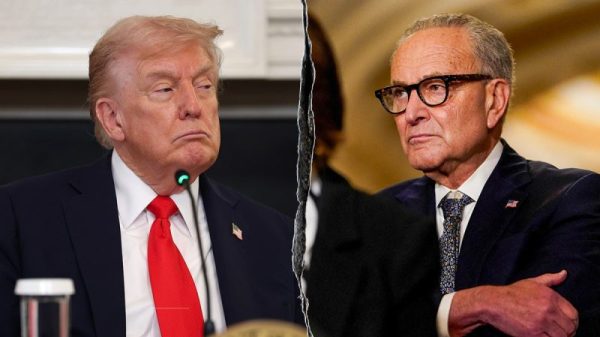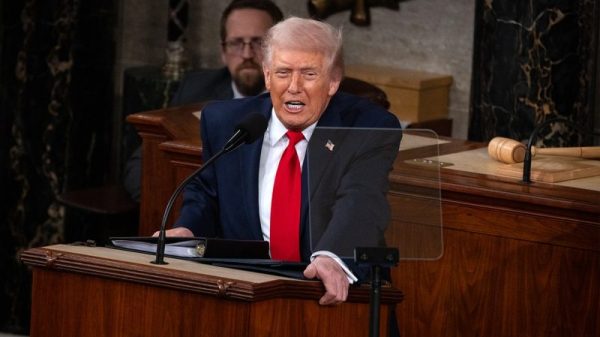Pro-Israel groups make up an increasingly large presence in Democratic primaries for Congress. Even so, the effort to unseat Rep. Jamaal Bowman (D-N.Y.) in Tuesday’s primary is extraordinary.
And the result could reverberate greatly in the evolving internal Democratic debate over the war in Gaza.
That’s because, while the dollar amounts are becoming larger and the results have been mostly positive for the pro-Israel groups, their record is still mixed in the highest-profile races. Unseating Bowman would be the strongest sign yet that criticizing Israel is a recipe for heartburn and may at least be a contributing factor in an incumbent’s loss. It would also be a particularly significant victory given that these groups failed to stop Bowman in 2020 — and given that the Democratic base has trended sharply away from Israel in recent months.
The United Democracy Project super PAC, which is aligned with the American Israel Public Affairs Committee (AIPAC) and another prominent group, Democratic Majority for Israel, have spent more than $60 million on Democratic congressional primaries since the 2020 election.
More than a quarter of that has now been spent to unseat Bowman, who faces Westchester County Executive George Latimer (D). The roughly $16 million these groups have spent on the race is more than double what they’ve spent on any other race. It’s also a sum rarely seen in a congressional primary.
The groups have spent extensively in plenty of races in recent years. More often than not, the investment has paid off. But this hasn’t necessarily meant the greater the sum spent, the greater the chance of victory.
Below is a review of how they’ve fared, based on data from Open Secrets:
These groups have spent at least $400,000 in each of 16 primaries since 2020. Their candidates have won 11 of them.
Their second-largest investment after Bowman’s 2024 race came in a 2022 Maryland primary, in which they helped thwart former congresswoman Donna F. Edwards’s (D-Md.) attempt to return to Congress, spending more than $6 million. Edwards, like other candidates opposed by these groups, had angered them with some of her stances on Israel.
They’ve succeeded in both of the races in which they’ve targeted incumbents like Bowman — Rep. Marie Newman (D-Ill.) and Rep. Andy Levin (D-Mich.) in 2022.
But Newman’s loss was lopsided despite a relatively small investment, suggesting she was on track to lose regardless. And the groups have failed in some of their most high-profile races. That includes Bowman’s defeat of incumbent Rep. Eliot L. Engel (D-N.Y.) in 2020, in which these groups spent $2 million to try to save the incumbent. It also includes a trio of races in which they’ve spent more than $4 million each: a California primary earlier this year, and wins by now-Reps. Summer Lee (D-Pa.) and Shri Thanedar (D-Mich.) in 2022.
They’ve also run into particular resistance when targeting lawmakers aligned with “The Squad,” a group of diverse, progressive Democratic lawmakers. That was the case with Bowman’s 2020 primary, as well as Lee’s in 2022.
In addition to targeting Bowman again, these groups have spent about $2 million so far this cycle against another member aligned with the Squad, Rep. Cori Bush (D-Mo.), who faces an Aug. 6 primary — the other big test for these groups.
While a Bowman loss would be the biggest signal yet of these groups’ might, it’s not so clear how much it would say about the issues they hold near and dear.
In Bowman’s race, like many others above, the advertising hasn’t actually focused on Israel-related issues. And Bowman has his own personal problems, apart from his comments criticizing Israel over the war in Gaza. They include his pleading guilty to a misdemeanor after he pulled a fire alarm during a heated congressional debate over a potential government shutdown. Bowman was later censured by the House.
But we’ve seen repeatedly in recent years how even the fear of an arduous primary can greatly affect members’ conduct. Very few members wind up losing primaries — none have lost so far this year, though Rep. Bob Good (R-Va.) appears likely to lose his uncalled race from last week — but members in safe districts like Bowman’s tend to toe their party’s line knowing their only real hurdle to reelection is the primary.
Should Bowman fall, you can bet his colleagues will notice.
Pro-Israel groups make up an increasingly large presence in Democratic primaries for Congress. Even so, the effort to unseat Rep. Jamaal Bowman (D-N.Y.) in Tuesday’s primary is extraordinary.
And the result could reverberate greatly in the evolving internal Democratic debate over the war in Gaza.
That’s because, while the dollar amounts are becoming larger and the results have been mostly positive for the pro-Israel groups, their record is still mixed in the highest-profile races. Unseating Bowman would be the strongest sign yet that criticizing Israel is a recipe for heartburn and may at least be a contributing factor in an incumbent’s loss. It would also be a particularly significant victory given that these groups failed to stop Bowman in 2020 — and given that the Democratic base has trended sharply away from Israel in recent months.
The United Democracy Project super PAC, which is aligned with the American Israel Public Affairs Committee (AIPAC) and another prominent group, Democratic Majority for Israel, have spent more than $60 million on Democratic congressional primaries since the 2020 election.
More than a quarter of that has now been spent to unseat Bowman, who faces Westchester County Executive George Latimer (D). The roughly $16 million these groups have spent on the race is more than double what they’ve spent on any other race. It’s also a sum rarely seen in a congressional primary.
The groups have spent extensively in plenty of races in recent years. More often than not, the investment has paid off. But this hasn’t necessarily meant the greater the sum spent, the greater the chance of victory.
Below is a review of how they’ve fared, based on data from Open Secrets:
These groups have spent at least $400,000 in each of 16 primaries since 2020. Their candidates have won 11 of them.
Their second-largest investment after Bowman’s 2024 race came in a 2022 Maryland primary, in which they helped thwart former congresswoman Donna F. Edwards’s (D-Md.) attempt to return to Congress, spending more than $6 million. Edwards, like other candidates opposed by these groups, had angered them with some of her stances on Israel.
They’ve succeeded in both of the races in which they’ve targeted incumbents like Bowman — Rep. Marie Newman (D-Ill.) and Rep. Andy Levin (D-Mich.) in 2022.
But Newman’s loss was lopsided despite a relatively small investment, suggesting she was on track to lose regardless. And the groups have failed in some of their most high-profile races. That includes Bowman’s defeat of incumbent Rep. Eliot L. Engel (D-N.Y.) in 2020, in which these groups spent $2 million to try to save the incumbent. It also includes a trio of races in which they’ve spent more than $4 million each: a California primary earlier this year, and wins by now-Reps. Summer Lee (D-Pa.) and Shri Thanedar (D-Mich.) in 2022.
They’ve also run into particular resistance when targeting lawmakers aligned with “The Squad,” a group of diverse, progressive Democratic lawmakers. That was the case with Bowman’s 2020 primary, as well as Lee’s in 2022.
In addition to targeting Bowman again, these groups have spent about $2 million so far this cycle against another member aligned with the Squad, Rep. Cori Bush (D-Mo.), who faces an Aug. 6 primary — the other big test for these groups.
While a Bowman loss would be the biggest signal yet of these groups’ might, it’s not so clear how much it would say about the issues they hold near and dear.
In Bowman’s race, like many others above, the advertising hasn’t actually focused on Israel-related issues. And Bowman has his own personal problems, apart from his comments criticizing Israel over the war in Gaza. They include his pleading guilty to a misdemeanor after he pulled a fire alarm during a heated congressional debate over a potential government shutdown. Bowman was later censured by the House.
But we’ve seen repeatedly in recent years how even the fear of an arduous primary can greatly affect members’ conduct. Very few members wind up losing primaries — none have lost so far this year, though Rep. Bob Good (R-Va.) appears likely to lose his uncalled race from last week — but members in safe districts like Bowman’s tend to toe their party’s line knowing their only real hurdle to reelection is the primary.
Should Bowman fall, you can bet his colleagues will notice.





















